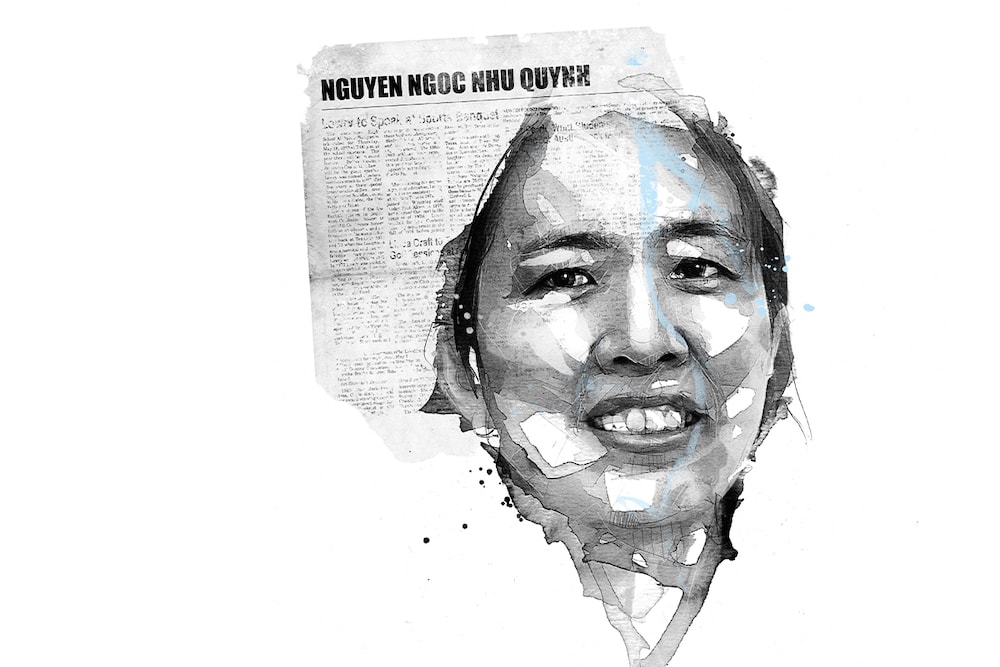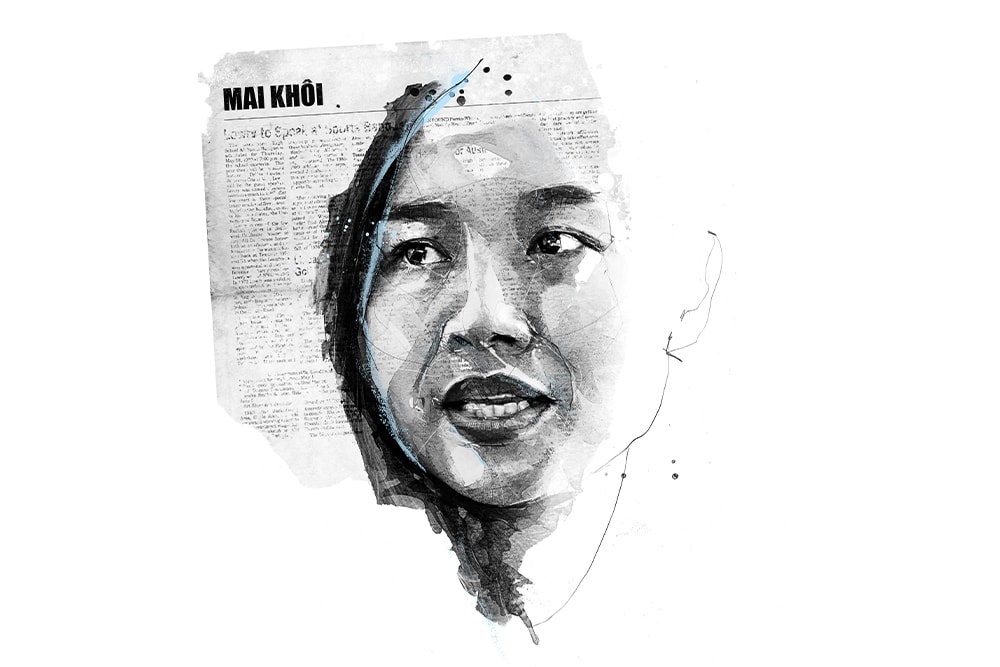Vietnamese blogger and environment advocate Nguyen Ngoc Nhu Quynh was jailed for two years for her dedication to telling the truth, no matter the cost.
I believe that women have a deeper perspective, and not only do we care about our own children and their well-being, we also tend to care more about the environment where they are growing up.
Nguyen Ngoc Nhu Quynh, known online as Me Nam (‘Mother Mushroom’), is one of Vietnam’s most famous dissident bloggers. On 29 June 2017, she was convicted – under Article 88 of the Penal Code – of “conducting propaganda against the Socialist Republic of Vietnam” and was handed a ten-year prison sentence. Her trial lasted only one day.
Quynh, whose online name comes from her youngest daughter’s nickname (‘Mushroom’), has been blogging since 2006. She writes about Vietnam’s social injustices, political issues and environmental problems, and is also one of the co-founders of the Vietnamese Bloggers Network. Quynh posts both to her own blog and to exile-run platforms such as Dan Lam Bao. She has received numerous prizes for her work, including the 2010 Hellman/Hammett Award, the 2015 Civil Rights Defender of the Year award, the 2017 International Women of Courage Award, and the 2018 International Press Freedom Awards.
Asked about her motivation to write about social injustice, she replied by posing the question: “Who will speak, if you don’t?”
In a Facebook post, she underscored the importance of speaking out against abuses. An excerpt of the translated content was published by Quartz:
“My generation has grown up in a scenario of lacking general awareness and knowledge, as our predecessors, my father and my grandfathers, chose silence for the sake of their own safety. Now is my time, and it has to be different.”
Quynh’s work is of vital importance in Vietnam, where the media is tightly controlled and political dissent is not tolerated. The internet provides her (and other dissidents) with the only effective platform for bypassing state censorship and communicating criticisms of the government directly to the public.
It should come as no surprise, then, that Vietnam’s authoritarian government works hard to restrict the freedom of the internet. The Ministry of Public Security has a dedicated internet monitoring unit which seeks, through a mixture of surveillance and regulation, to control the online activities of Vietnam’s citizens. The government has issued a number of regulations curtailing online free speech, including the 2008 Ministry of Information Circular No. 7 (which bans bloggers from posting about politics, state secrets and national security), and the 2010 order to install internet monitoring software in computers in all internet cafes in Hanoi. Also, anyone visiting an internet café has to provide photo identification and has their online activities logged by the café’s owner.
Before her arrest on 10 October 2016, the Vietnamese authorities had been harassing Quynh for years: at various times she had been assaulted, threatened and banned from travelling because of her blogging. In 2009, after she posted an entry criticising government foreign policy regarding a territorial dispute with China, she was placed in detention and questioned for nine days; she was also pressured to shut down her blog. Following her release, Quynh was subjected to highly intrusive surveillance by the authorities.
This surveillance was part of a two-pronged attack that the government launched against bloggers and internet activists (at home and in exile) in 2010. The strategy combined old-fashioned intimidation techniques – at least seven bloggers were detained during the first two months of this campaign – with 21st century digital tactics. The latter included cyber attacks on critical blogs and the use of malware to infect and monitor the computers of dissident bloggers; the authorities also used these infected computers to launch distributed denial-of-service (DDoS) attacks on other machines. Neel Mehta, blogging for the Google Security Team, estimated that tens of thousands of computers could have been affected.
At the time of her 2016 arrest, Quynh was visiting the jailed activist Nguyen Huu Quoc Duy. Police reportedly forced Quynh into a car and drove her to her home. There, they confiscated her mobile phone, computer equipment and placards protesting a recent toxic waste spill. She was then transferred to a police detention centre, charged with “conducting propaganda” and held incommunicado without access to her lawyer until nine days before her trial in June 2017.
News of the arrest outraged the international rights community. Within days, the UN High Commissioner for Human Rights, Zeid Ra’ad Al Hussein, called for the charges to be dropped and for Quynh to be released. In March 2017, five UN Special Rapporteurs issued a joint statement condemning the charges and the harsh conditions in which the blogger was being held.
She protested her incarceration by staging several hunger strikes. She was subjected to eight months of solitary confinement before her transfer to a prison 1,000 kilometers away from her family.
Just days before Quynh’s trial, her mother said that, in addition to being prevented from visiting her daughter in jail, she too had been subjected to surveillance.
During the brief trial, authorities presented as evidence her interviews with CNN and Radio Free Asia, including her Facebook posts about fish deaths resulting from a toxic spill, China’s aggression in the South China Sea, and police brutality in Vietnam.
After a sustained global campaign, she was finally released for humanitarian reasons on 17 October 2018 and immediately exiled to the United States with her family. Her release was conditional on forced exile and a suspended prison sentence. She continued her advocacy from exile, a strong voice calling for the release of detained bloggers and journalists in Vietnam.
In an interview with Voice of America Khmer reporter Soksreinith Ten, she gave this advice to fellow bloggers:
“We are not alone, because freedom is something that all of us, each and everyone of us, aspires to. Because of that common factor, because we all dream of the same dream, we are not alone and so if you can just overcome the personal fear of yours, you will find many, many other supporters out there. The minute that you speak out, thousands of other voices will join you. That is what we will draw our strength and force from.”
Illustration by Florian Nicolle

